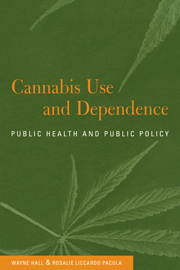Book contents
- Frontmatter
- Dedication
- Contents
- List of figures and tables
- Foreword
- Acknowledgements
- 1 Introduction
- Section 1 Cannabis the drug and how it is used
- Section 2 The health effects of cannabis
- Section 3 The psychological effects of chronic cannabis use
- Section 4 Effects on adolescent development
- Section 5 Harms and benefits of cannabis use
- Section 6 The effectiveness and costs of cannabis prohibition
- Section 7 Policy alternatives
- Appendix 1
- Appendix 2
- References
- Index
Section 7 - Policy alternatives
Published online by Cambridge University Press: 05 July 2016
- Frontmatter
- Dedication
- Contents
- List of figures and tables
- Foreword
- Acknowledgements
- 1 Introduction
- Section 1 Cannabis the drug and how it is used
- Section 2 The health effects of cannabis
- Section 3 The psychological effects of chronic cannabis use
- Section 4 Effects on adolescent development
- Section 5 Harms and benefits of cannabis use
- Section 6 The effectiveness and costs of cannabis prohibition
- Section 7 Policy alternatives
- Appendix 1
- Appendix 2
- References
- Index
Summary
All developed countries today prohibit in some fashion the possession, use, cultivation, distribution and sale of cannabis and cannabis products. They vary in the type of behaviour that is proscribed, the resources that are devoted to enforcing the laws and the penalties that are imposed on those who break these laws. These variations in laws and their enforcement, which together determine policy, make it impossible to talk about cannabis prohibition as if it were a single policy. It is more accurate to think of prohibition as a range of policies that can be differentiated by their legal treatment of suppliers and users and, more importantly, by the ways in which laws are enforced and by the sanctions that are imposed on suppliers and users.
When discussing variations on prohibition, it is useful to distinguish between policies aimed at the supply of cannabis (cultivation, distribution and sale offences) and policies aimed at the user (possession and use offences). This distinction makes it easier to differentiate between legal and illegal markets. When the supply of cannabis is prohibited, then the market is operationally illegal because the government does not allow the drug to be brought to a marketplace. Technically, the term prohibition can be applied to any policy that prohibits the supply of cannabis, regardless of the way it treats users. This is the way we define prohibition in this section and throughout the book.
In Chapter 17, we discuss variants of prohibition that differ in the legal penalties that are imposed on users (e.g. no penalties, fines, diversion to treatment and gaol sentences). In Chapter 18, we consider different types of legal cannabis markets. These identify a range of possible legal and regulatory arrangements that would allow cannabis to be supplied by a legal market. We stress that some existing features of cannabis prohibition may remain in a legal market. These may include restrictions on: the types of cannabis products that can be sold, who can sell cannabis, how much they can sell, and to whom it can be sold. We treat these restrictions as forms of regulation rather than as variants of prohibition because they would be applied in an environment in which cannabis supply was sanctioned by the government.
- Type
- Chapter
- Information
- Cannabis Use and DependencePublic Health and Public Policy, pp. 183 - 186Publisher: Cambridge University PressPrint publication year: 2002



